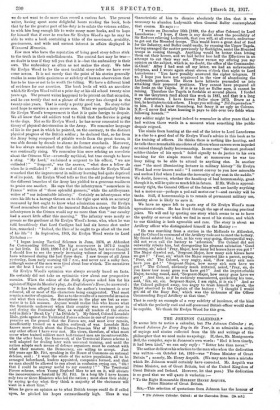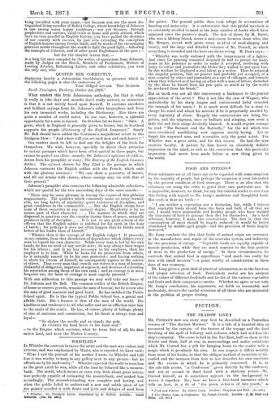THE JOHNSON CALENDAR.*
IT seems late to notice a calendar, but The Johnson Calendar ; or, Samuel Johnson for Every Day in the Year, is so admirable a series of sayings and stories collected from the life and writings of the philosopher that we need make no apology. If, then, Mr. Montgomerie Bell, the compiler, says in Johnson's own words: "Had it been timely, it had been kind," we can only reply : " Better late than never."
The author dedicates his selection to the man who when the dedication was written—on October 1st, 1916—was " Prime Minister of Great Britain " ; namely, Mr. Henry Asquith. (We may note here a mistake which Dr. Johnson would certainly have corrected. Mr. Asquith was Primo Minister, not of Groat Britain, but of the United Kingdom of Great Britain and Ireland. However, let that pass.) The dedication is so good that we will quote it verbatim :- " To the Right Honourable HERBERT HERBY Aseurrw,
Prime Minister of Great Britain.
Sra,—This selection of quotations from Johnson has the honour of • The Johnson Calendar. Oxford : at the Clarendon Press. 121. net.1
being inscribed withyour name,—not because you arc the most dis- tinguished living member of Balliol College, where knowledge of Johnson is one among many happy traditions ;—nor yet because, through perplexities and sorrows, amid trials at home and perils abroad, which have no true parallel in English history, you have guided the destinies of our country with success, by just acts extending the conception of English honour among foreign lands, and by words of fire encouraging generous minds throughout the world to fight the good fight,—following the example of Johnson, and of other great Englishmen of the past ;—
but for tho simpler reason that,— in a long list once compiled by the writer, of quotations from Johnson,
made by Judges on the Bench, Members of Parliament, Writers of Leading Articles, Reforming Ladies, and other celebrities, you were the only one, who QUOTED HIM CORRECTLY, displaying hereby a Johnsonian truthfulness, to preserve which in the following pages is also the endeavour of Your obliged servant TUE AUTHOR. South Newington, Banbury, October 1st, 1916."
What renders this little Johnsonian anthology, for that is what it really is (the days and months don't really matter), so attractive is that it is not merely based upon BoswelL It contains anecdotes and brilliant sayings from Dr. Johnson's other biographers and from his own immortal works, including the Dictionary. Also there are quite a number of useful notes. In one case, however, a splendid opportunity for a note is missed. On October 1st we have : " Oats. A grain, which in England is generally given to horses, but in Scotland supports the people (Dictionary of the English Language)." Surely Mr. Bell should have added the Scotsman's magnificent retort to this bludgeon blow : " And where will you see such men and such horses ? "
Our readers must be left to find out the delights of the book for themselves. We wish, however, specially to direct their attention to certain passages which have been often quoted in these pages. but cannot be quoted too often—namely, Dr. Johnson's opinions of soldiers, drawn from his pamphlet or essay, The Bravery of the English Common Soldier. The extract chosen for May 22nd is the passage in which Johnson contrasts the English soldier with the French, which ends with the glorious sentence : " We can show a peasantry of heroes, and fill our armies with clowns, whose courage may vie with that of their general."
Johnson's pamphlet also contains the following admirable reflections, which are quoted for the two succeeding days of the same month :— " There may be some pleasure in tracing the causes of this plebeian magnanimity. The qualities which commonly make an army formid- able, are long habits of regularity, great exactness of discipline, and great confidence in the commander. . . . But the English troops have none of these requisites in any eminent degree. Regularity is by no means part of their character. . . . The manner in which they are dispersed in quarters over the country during times of peace, naturally produces laxity of discipline. . . . It is not to any great esteem of the officers that the English soldier is indebted for his spirit in the hour of battle ; for perhaps it does not often happen that he thinks much better of his leader than of himself."
" Whence then is the courage of the English vulgar ? It proceeds, in my opinion, from that dissolution of dependence which obliges every man to regard his own character. While every man is fed by his own hands, he has no need of any servile arts ; he may always have wages for his labour ; and is no less necessary to his employer, than his employer is to him. While he looks for no protection from others, he is naturally roused to be his own protector ; and having nothing to abate his esteem of himself, he consequently aspires to the esteem of others. Thus every man that crowds our streets is a man of honour, disdainful of obligation, impatient of reproach, and desirous of extending his reputation among those of his own rank ; and as courage is in most frequent use, tho fame of courage is most eagerly pursued."
With one addendum to this passage wo may well take our leave of Dr. Johnson and Mr. Bell. The common soldier of the British Empire, of home or oversee growth, remains the man of honour, but he is now also the man of good manners and good heart. He has imbibed the Public School spirit. He is like the typical Public School boy, a genial and affable Stoic. His tlerance is that of the man of the world. His kindliness and tenderness to all who suffer and are in affliction raise him to the ranks of the saints. He has, of course, plenty of failings, plenty of sins of omission and commission, but his heart is always true and loyal-
" So shakes the needle and so stands the pole As vibrates his fond heart to his fixed soul " —to the Empire which contains, what he loves first of all, his dear native land, and next the Mother C3untry.



























 Previous page
Previous page